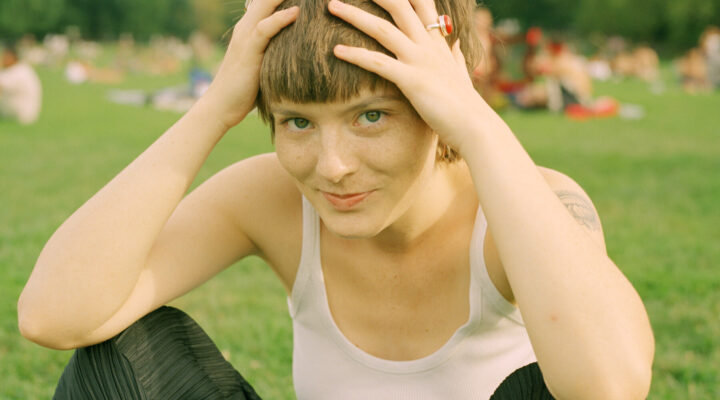An Interview with Rakhi Singh
by Sydney van Nieuwaal
Photo #1 by Phil Sharp for Manchester Collective
Rakhi Singh is violinist, composer & music director. Singh uses strings, her voice and the infusion of electronics to forge layered compositions that find rumbling energies buried inside of them. At the dawn of her performance in 4DSOUND for Aural Spaces at Concertgebouw, we spoke with Singh about spatialization of sound, her debut EP and the ‘new kind of art organization’, Manchester Collective.
Rakhi Singh performs in 4DSOUND at Aural Spaces, in Concertgebouw on December 18th. There are limited free tickets for Subbacultcha members. Learn more about Aural Spaces here.
Hi Rakhi. Next month, you will be performing pieces for violin and electronics on a 4DSOUND system, for Aural Spaces in Concertgebouw. Can you tell me something more about how you approached the possibilities with regards to spatiality and diffusion of sound?
Well, there’s a huge variety of material in my program. Each of the pieces can be treated in a different way, sonically and spatially. On one of the pieces, where I’m playing in a sort of ethereal way, the only effect is a particular reverb. So, we worked out to send that sound around the room, so it passes next to people in a really effective way of moving this piece within the space. But then another piece I play, which is written for bagpipes, is very droney and has a lot of slides moving upwards. We experimented with making the slides go up over the columns where people might be standing, and having the drone right on the floor. It’s really fun to physicalize sound technically, rather than solely in my own spirit.
How much freedom do you have in physicalizing the sounds while playing?
I work together with the sound engineer, so we figure out a majority of the set in advance. We actually spent a week in MONOM, in Berlin, to try things out.

You performed it there as well, right? Did the spatial aspect change or alter your relationship to the audience in any way?
Well, I actually found out that I find the 4DSOUND system most effective when the audience moves around as well. I really want people to create their own experience within this. I move myself as well, and I’m trying to be in the space as much as possible, so we all become a kind of organism.
Can you tell me something more about the piece written for bagpipes?
That’s a piece by a composer named Julia Wolfe, called ‘Lad’. It’s originally written for nine bagpipes, but I asked her if I could do it on the violin and she gave me permission. It’s such a powerful piece. Also, I play with an octave pedal, it’s 17 minutes long and really builds towards something. It’s a ‘knock-people-off-their-seat’ kind of thing.
Exciting! Are you playing material from your latest EP, Quarry, as well?
My plan is to do so! It will actually be the first time.
So, the description of Quarry reads that the project represents ‘a marker in the sand’, ‘the first steps of a journey of discovery’. What do you feel you started exploring with this material?
My own voice. I’ve spent my whole life playing other people’s music and this is purely mine. It’s about gaining confidence as well.
Quarry is inspired by the dialogue between hope and regret, and the dialogue between loss and discovery. Can you tell me something more about those dialogues between extremes?
We all have periods of up and down. Not just in an artistic sense, but in life, you know. In decisions and in luck. I guess from playing an instrument from a young age, I worked out quite quickly that some days playing feels natural and good, and other days it’s a real struggle. So it’s about that from micro to macro level. But, I think once you recognize that and accept it, you’re actually able to let something go. Also, the music was made at a time where I had a bit of a personal up and down. There was a creation of a life and a loss of one quite soon afterwards.That’s kind of present in it as well. I found that the music brought out a sort of accepting kind of love. But, I don’t want to influence people’s experience of it too much!
I see! The record is titled after human-made craters, and the video for ‘Khuda’i (Excavation)’ features blurred, stretched and obscured imagery that, to me, translate as some sort of sediment layers. What brought you to these themes of unearthing, layering and the underground?
I guess it’s both physical and metaphorical. Near my family home in Wales, which I visit often, are literal quarries where they’d mined for limestone. As physical spaces I find them inspiring and intriguing. Also, there was an incredible acoustic in one of them. If I stood in a perfect spot and sang or said something, it would resonate as a natural amphitheater. I took my violin there one time. Actually, my dream is to take a Welsh male voice choir there, which is very much based around the mining culture. But, I think there’s something special about beauty, coming out of destruction or excavation. When you stand in them you feel very small. So, I realized that it’s similar to what I’ve been doing internally to make this record as well. I’ve been digging within myself.
You’re the co-founder and music director of Manchester Collective, which is about “radical human experiences”. Can you clarify what is meant by these kinds of experiences?
Within the classical world people don’t often talk about experiences. You go to a concert, to see people playing their instruments. But, we treat the whole thing as an experience. From the minute you walk to the door, to how people are greeting you, to how we present ourselves on stage, to whether there even is a stage. We want to strip away all those layers and traditions, and to present the music as honestly possible as it feels to us. Another word for a tradition is a rule. That’s sort of the idea behind the radical human experiences. Music is a powerful medium, and we want to give the power back to the performers. I think a lot of classical musicians have forgotten that they’re the ones with the power. We try to deliver with our whole hearts and are trying not to be constrained doing so.
‘Manchester Collective are musicians, but also producers, dancers and film-makers. We are recording engineers. We are copy-writers and fundraisers, directors, commissioners and choreographers. We are composers. (So many composers). We are electronic musicians, programmers, photographers and researchers.’ The line-up changes seasonally as well. What values, missions or positions make you a collective?
We’re about six years old now, and in the time a new type of culture within classical music emerged. The rehearsal space is very open and, I hope, supportive. We ask people to bring all of themselves, but in order to do that you have to create the right environment where people feel safe to do so. It’s about being vulnerable.
In press texts and biographies of the Manchester Collective I read a lot about time. About being aware of history, about incorporating the past and about the peculiar position your recordings fit in; namely that of performing music written in time spans often longer than a century or two. “(…) from sacred chorales by Bach through to new material by Paul Clark”. This ties in with Quarry to me as well: the encapsulation and exploration of time by digging and excavating. What about the capturing of time resonates to you?
I guess as beings. We’re all here for our split second, in the grand scheme of things. I think I feel a sense of belonging when I’m linked to something in the past, and bring that with me to the future. I think we all have a but if our ancestors’ spirit within us. Like the violins that I play, made 200 years ago. A person made that with their own bare hands and I get to play it now. I am a makeup of all things that have come before me. Looking back gives me a sense of how big the world and the universe are. I find that really enjoyable. It’s amazing. People think and express things very differently, but there’s so many kinds of universal emotions to experience. People are still at war, and people still love.
Rakhi Singh performs in 4DSOUND at Aural Spaces, in Concertgebouw, on December 18th. There are limited free tickets for Subbacultcha members. Learn more about Aural Spaces here.




